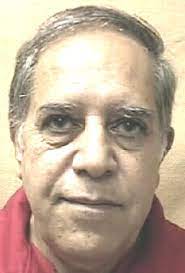Elias Syriani was executed by the State of North Carolina for the murder of his wife Teresa Yousef Syriani
According to court documents Elias Syriani was separated from his wife Teresa Yousef Syriani. On the night of the murder Elias would force Teresa vehicle off of the road and would stab her to death with a screwdriver
Elias Syriani would be arrested, convicted and sentenced to death
Elias Syriani would be executed by lethal injection on November 18 2005
Elias Syriani Photos

Elias Syriani FAQ
When Was Elias Syriani Executed
Elias Syriani was executed on November 18 2005
Elias Syriani Case
Elias Syriani was pronounced dead at 2:12 a.m. at Central Prison, where he had visited and hugged his children beforehand after 15 years locked away from their touch. The children – including a son who witnessed the attack and testified against Syriani – argued that letting him live would allow them to restore their connection to their mother, Teresa.
In his final statement, Syriani thanked his family and friends who shared “with me my sufferings for 15 years and four months and they so encouraged me.” Syriani looked into the witness room, just on the other side of thick glass panes, when he was wheeled on a gurney into the death chamber and smiled at a couple who had visited him regularly for the past four years. His children, brother Tony Syriani and sister Odeet Syriani weren’t there, nor were the children.
Two Charlotte detectives, six prison employees and five reporters watched the execution in addition to the two friends. Syriani was the fourth execution this year in North Carolina. In an animated conversation through the glass, Syriani appeared to say that he wanted his children to be happy and that he loved his wife, who said she wanted a divorce before she was killed. “This is a day of overwhelming sadness,” defense lawyer Henderson Hill said after the execution. “Tonight we punished four innocent children already scarred by family violence. … By taking the life of a man in the process of giving life back to his kids, we betray our own humanity.”
Russ Sizemore, a lawyer representing the children, said it was “incomprehensible” that Easley denied clemency after hearing from Rose, Janet and John Syriani and Sarah Barbari, who had been raised by their aunt and uncle in Chicago after their mother died.
At the time of the killing, Syriani was living apart from his family and was under a restraining order. The children “have traveled so far in the process of healing from the terrible wounds of a horrible domestic tragedy that it is nothing short of cruel that their journey would be violently interrupted tonight by another death, a death entirely within our power to prevent,” Sizemore said.
Easley said in a statement that he found “no convincing reason to grant clemency and overturn the unanimous jury verdict affirmed by the state and federal courts.”
Syriani was convicted in the death of his wife, Teresa, 40, who was stabbed 28 times with a screwdriver in Charlotte. She died 26 days later from the attack that happened after her husband stopped her as she drove home from work and tried to get away from him. The children hadn’t seen their father on death row until two years ago and have since said they have forgiven him. Part of their forgiveness stemmed from learning about his traumatic upbringing as an Assyrian Christian in Jerusalem and Jordan.
Easley has granted clemency twice since taking office in 2001, but has not spared the life of any death row inmate since January 2002. North Carolina governors have granted clemency only three other times since the state resumed executions in 1984 after a hiatus while the U.S. Supreme Court determined its constitutionality.
Nationally, clemency was granted 186 times – including 167 commutations by the Illinois governor in 2003 – between 2001 and 2005, according to the Death Penalty Information Center.
http://www.charlotte.com/mld/charlotte/news/columnists/tommy_tomlinson/13201355.htm









